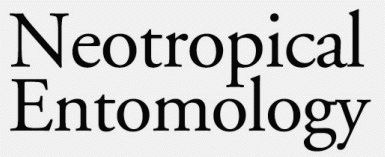The fungus Nomuraea rileyi (Farlow) Samson is one of the most important natural enemies of soybean caterpillars, mainly under humid weather conditions. Outbreaks of the fungus Microsphaera diffusa Cooke & Peck have demanded fungicide applications on soybeans, which could result in outbreaks of noctuid populations by reduction of the natural inocula of N. rileyi. The recommended fungicides have shown to be detrimental to beneficial fungi, reducing infection, delaying epizootics, and resulting in increased host population densities. In laboratory assays, benomyl, difenoconazole, sulphur and carbendazim affected conidial germination of N. rileyi, being the latter less deleterious. To assess the impact of fungicides used to control M. diffusa, on N. rileyi, two tests were carried on, spraying difenoconazole (75 g a.i./ha) and benomyl (262.5 g a.i./ha) on soybean plots. In the 1997/98 trial, fungicide was sprayed once on soybean plants at R1-R2 developmental stages. In the 1998/99 test, two applications were made, when plants were at V5 and V7 developmental stages, respectively. The number of VBC larvae was significantly higher in the fungicide treated plots than in the control plots. In the 1997/98 test, benomyl treated plots resulted in higher populations of VBC than in the control or in the difenoconazole plots. In the 1998/99 test, VBC population was higher from 7 to 12 days after the first application, and remained high until 19 days after the second application. In general, fungicide treatments delayed the begining of N. rileyi epizootics from 2 to 14 days.
Entomopathogenic fungi; difenoconazole; benomyl; carbendazim; Microsphaera diffusa; biocontrol

 The impact of fungicides on Nomuraea rileyi (Farlow) Samson epizootics and on populations of Anticarsia gemmatalis Hübner (Lepidoptera: Noctuidae), on soybean
The impact of fungicides on Nomuraea rileyi (Farlow) Samson epizootics and on populations of Anticarsia gemmatalis Hübner (Lepidoptera: Noctuidae), on soybean


